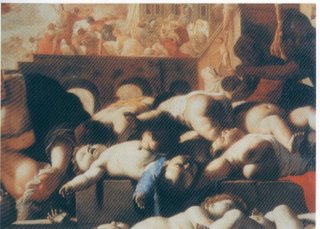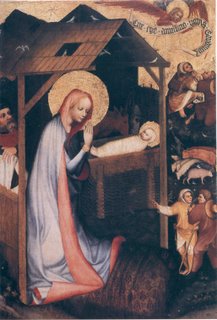
To understand the Old Testament, one has to get the truths and interconnect them into a unified whole. To understand the New Testament, one has to get the truths and interconnect them into a unified whole; and also interconnect them with the Old Testament, since the New is built on the Old. To understand the writings of the Fathers of the Church, the same thing must be done. In the Sacrifice of the Mass, there are three readings, one from the Old Testament; and two from the New Testament: one from the epistles or letters, and another from the Gospel. The priest is encouraged to interconnect these three into a unified whole which would be the message of the Mass.
I would, again, as in past issues, liken these truths into a jigsaw puzzle where each tile fits in snuggly with the others forming a coherent whole. But I noticed a piece of the puzzle that did not fit. Trying to fit in this certain piece of tile, I found that there was no way I could fit it into the whole. That piece was the common notion that babies who died unbaptized did not go to Heaven; that, instead, they went to Limbo. This notion, to me, seemed to contradict much of the teachings given by Christ, Himself.
The only way I thought this small piece could fit in was to have this doctrine clarified. Without knowing how to explain it, nor wanting to seem contradicting even those great saints like St. Augustine who stated that babies could not go to Heaven because of the absence of grace, and St.Thomas Aquinas who confirmed this, I thought that babies who die unbaptized, did go straight to Heaven. But how could I explain such seeming contradiction to those great minds such as St. Augustine and St. Thomas? The only way I thought this could be resolved was to have this doctrine redefined.
Then news came out that Pope Benedict, indeed, had trimmed the small part and fitted it into the whole picture….Unbaptized babies, when they die, go straight to Heaven. The Pope has clarified it! The debate between the old concept and the new declaration now goes on.
Were the Fathers wrong? No. Their theological principle was right. No one goes into Heaven without grace. Do deceased unbaptized babies have grace or not? The argument before is that they do not have grace because of original sin. But to be in a state of innocence, is this not a kind of grace, natural though it may be? And what is original sin? It isn’t mortal sin. If so, then they would be damned. But original sin is not a “sin.” It is that tendency to choose evil, or commit sin, which all men have inherited from, and after the fall of, our first parents. All babies are born saints, but are condemned to the fact that when they grow up, they would lose this childlike innocence, or in-born sanctity, if their parents do not train them well in the Christian life.
This God-given sanctity bestowed on children can easily be lost as Adam and Eve lost their pristine state in Paradise. Adam and Eve were supposed to have been preserved in it by their obedience. Parents, unfortunately, are unable to help their children preserve that in-born innocence through ignorance or mere carelessness and neglect.
The dictatorship of relativism is the fastest way to destroy that initial innocence. So when children lose this, they have to “be born again” and become children once more to enter the Kingdom of Heaven through repentance.
The Fathers of the Church did not bother about resolving this issue on unbaptized children because it was a case that was completely in the hands of God: i.e. if an unbaptized baby dies, there was nothing anyone could do for the soul, like in abortion. God decides regardless of what theological opinion man has. Except that we, in this age do wonder what happens. Perhaps we need to wonder, so that those who kill babies would perceive the great punishment due if they will not repent for killing holy innocents.
Christ gave us children to be the models to be imitated in order to enter the Kingdom of Heaven. When He did so, He points to that brief moment of initial innocence in the child’s life. When He said “Unless you become like children…” He was not referring to baptized children; but merely to children. When He said: “Whatever you do to the least of these little ones, you do to Me…” He shows solidarity with them at that brief moment of their untainted life.
Considering that God desires the salvation of all men, why would He create a soul, if it will only be immediately condemned to hell, if indeed unbaptized babies did go to Hell? If He desires all sinners “to be converted and live,” why would He want a non- sinner to have no occasion to be converted and live? If we are advised by the Lord “to be as little children” in order to enter the Kingdom of Heaven, why should unbaptized children not enter Heaven? How could He set them up as examples to be imitated in their humility if in the end they could not go to Heaven if they had died unbaptized? “To such belongs the Kingdom of Heaven;” who are we to condemn them to Limbo? None of the statements of the Lord referring to children ever showed hints that they were destined to Limbo. The whole of Scriptures bids us to become like children and shows us how to be like them.
Like Adam and Eve in Paradise, all men have the same chance of being for a moment in Paradise, when we were in that state of innocence when we were pleasing to God. If we had died before we lost this innocence, we would have gone straight to Heaven, baptized or not. But being children of Eve, we, too, must undergo our own tests which come when we have reached the age of reason. Here is where Christian parents could do a lot by way of Christian upbringing if they would protect their children from the onslaught of original sin. This is what it means to have inherited the original sin of our first parents : that, with the exemption of Mary, and perhaps Joseph and John the Baptist, all men are consigned to sin, meaning, we will all fall short of the grace of God as we reach the age of reason.
Thanks to our Holy Father, he has made the picture clear! (Painting is "The Massacre of the Innocents " from the second half of the 17th century from a private collection.)



